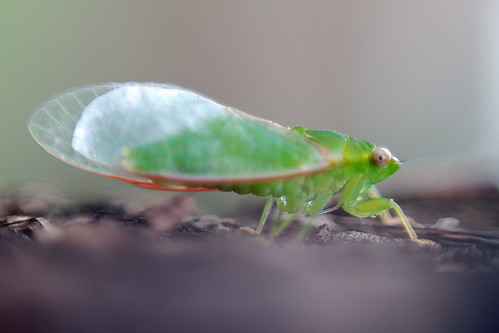This is WHAT it will become...
 |
| Photo by Digilbo |
This
insect's amazing lifestyle has been a source of fascination since
ancient times. Several cultures, such as the ancient Chinese, regarded
these insects as powerful symbols of rebirth.
Cicadas spend most of their time underground feeding on roots. But every now and then they come out. There are annual and periodical cicadas. The cicadas in a periodical cicada population are synchronized so that almost all of them mature into adults in the same year. The fact that these cicadas remain locked together in time is made even more amazing by their extremely long life-cycles of 13 to 17 years."
"Cicadas help the environment. They improve soil, provide food for other animals and prune treetops. Periodical cicadas achieve astounding population densities, as high as 1.5 million per acre. Densities of tens to hundreds of thousands per acre are more common.
Some people even like to eat the bugs! Whether they're curious or doing it for shock value, people are eating cicadas. Eating cicadas is not a new thing. People have been eating them for centuries.
"When you eat them when they're soft and mushy, when they come out of their skin, they taste like cold, canned asparagus," Kritsky said.
Cicadas are harmless. They do not bite or sting defensively, nor do they attack people. If a cicada lands on you, it does so only because it finds you to be a convenient place to land."
♥ ♥ ♥
And KUDOS to the following:
Joey at the The Village Voice who discovered the very same creature in her soil way far away in Michigan. So nice to know we have such a deep connection.
Holley at Roses and Other Gardening Joys who made me smile with her Mexican Jumping Beans guess.
Beth at PlantPostings who knew it's a big year for Cicadas. Not so much here in Utah but surely in the south.
Christine at The Gardening Blog who's seen similar in her own garden.
Karen at Glimpses of Glory who is a new visitor to my gardens... so glad you found me!
And Susan at Ink and Pestemon whose comments are always a welcome sight.
And for the curious,
no... it hasn't emerged yet.
At least I don't really know. I just leave them in the soil when I find them so that they may fulfill the measure of their creation. (Don't wanna mess with Mother Nature.)


most people around here are annoyed by them but i think it's fascinating that they live underground for 13 yrs. only to emerge for a few weeks. they are starting to slowly die off around here. (TN)
ReplyDeleteHow interesting. Now I will have to look and see if I can find any.
ReplyDeleteI find them here too. Once uncovered the birds make short work of them.
ReplyDelete13 years! Wow, isn't nature wonderful. Thanks for this - I'kll treat these funny things with a bit more respect now that I know all this.
ReplyDeleteI'll have to watch for them. I hear them in the trees sometimes. Good to know they're helpful to the environment. Glad I'm not having asparagus for supper!
ReplyDeleteGreat post! You're invited to link to my Friday Creature Feature (posted on the first Friday of every month).
ReplyDeleteI frequently uncover them in my neck of the woods as well..
ReplyDeleteInteresting. Never saw a cicada here before. Wild what's under the dirt sometimes.
ReplyDeleteOur summers would not be the same without the song of cicadas, rising and falling in the trees.
ReplyDeleteCarolyn my goodness that was a great detail shot of this "bug" .. we have them here .. the noise can be deafening to me since it is the same pitch as my tinnitus .. I try to avoid that extra noise if possible?
ReplyDeleteI read your comment on (Linda)Crafty Gardener's blog about never having a fuchsia plant before and I was floored! LOL ..
I know there must be plants out there that I have never acquired .. there has to be ... right ? wink wink
Joy : )
My son and I love to hunt for their shells in the fall.
ReplyDeleteI remember visiting a place as a kid. No idea exactly where or when, but I remember the deafening sound of the cicadas.
ReplyDeleteHi Carolyn,
ReplyDeleteI've seen those things before, too, and it's cool to know what they are! Thanks for such an educational post. I think I'll pass on eating them, though, even though I enjoyed the cold leftover asparagus I put on my salad for lunch.